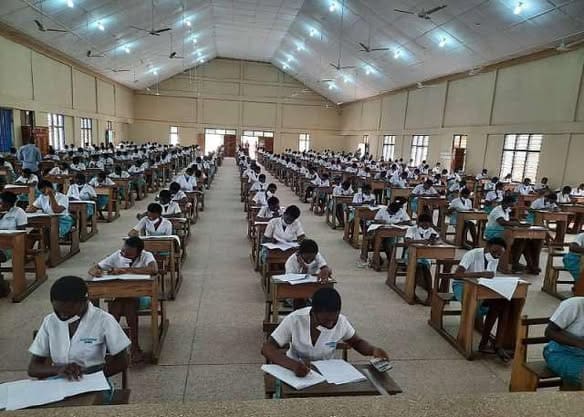Ghana’s Basic Education Certificate Examination faces mounting criticism over a grading system that educators argue incentivizes cheating while penalizing high-achieving students through predetermined grade distributions.
The West African Examinations Council has confirmed several cases of examination malpractice in the ongoing 2025 BECE, with officials warning numbers may rise as examinations progress. The developments have reignited debate over the Stanine grading system used for the national examination.
WAEC employs a norm-referenced approach that fixes predetermined percentages for each grade regardless of overall student performance. Only four percent of candidates can earn Grade 1, seven percent Grade 2, and twelve percent Grade 3, creating a bell curve distribution that remains constant annually.
Research has revealed that the Stanine grading system is norm-referenced and unsuitable for both selection and certification, with individual grades determined not only by performance but by how others perform. This means students scoring 90 percent could receive Grade 2 if more than four percent of candidates scored higher.
A Ghanaian educationist recently described the system as “unfortunate, an outmoded grading system that favours schools that cheat,” noting that many institutions no longer value integrity. Critics argue the fixed-percentage model forces schools and students toward malpractice to secure limited top grades.
WAEC reported over 14,000 students had results withheld due to suspected malpractices in 2022 alone, indicating the scale of the problem predates current concerns. For 2025, WAEC identified Bono, Bono East, and Ahafo regions as having the highest number of malpractice cases, with 18,504 candidates involved in 2023.
The norm-referenced system means widespread cheating inflates raw scores without changing grade percentages. Instead, cutoff scores rise, potentially denying honest students higher grades despite strong absolute performance. Education analysts describe this as particularly problematic for students from under-resourced schools.
Concurrent placement policies have created additional equity concerns. Until 2025, the Ministry of Education reserved 30 percent of Category A public senior high school slots exclusively for students from government junior high schools. This quota was reduced to 15 percent for 2025 admissions following sustained criticism.
The policy prompted strategic transfers as parents moved children from private to public schools before completing junior high to qualify for preferential placement. Private school proprietors reported dramatic enrollment losses, with some describing entire classes emptying as students transferred.
WAEC maintains detection systems including monitoring hotspot regions and conducting post-exam reviews. However, this process occurs after marking and norming, potentially affecting grade distributions for honest candidates whose relative standing suffers from inflated scores among cheating peers.
A recent analysis noted that Ghana’s BECE uses an approach that “fixes the share of students” rather than measuring absolute achievement, distinguishing it from criterion-referenced systems that evaluate mastery of curriculum content.
Education experts suggest reforms including criterion-referenced grading that measures syllabus mastery rather than relative ranking. This approach already exists in Ghana’s classroom assessments and could provide more meaningful evaluation of student learning outcomes.
The intersection of norm-referenced grading with quota-based placement creates what critics describe as a double burden for students. High performers may receive lower grades due to curve constraints while facing additional barriers through placement quotas based on school type rather than individual merit.
Moving forward, policymakers face balancing merit recognition with equity concerns. Enhanced exam security measures and transparent processes could address malpractice, while grading reforms might better reflect student achievement rather than administrative convenience.
The current system’s defenders argue it ensures year-to-year consistency and prevents grade inflation. However, growing evidence suggests unintended consequences may outweigh intended benefits, particularly as malpractice rates increase and public confidence in examination integrity declines.
Reform discussions continue as Ghana’s education sector grapples with maintaining examination standards while ensuring fair recognition of student achievement in an increasingly competitive academic environment.
Source: newsghana.com.gh











